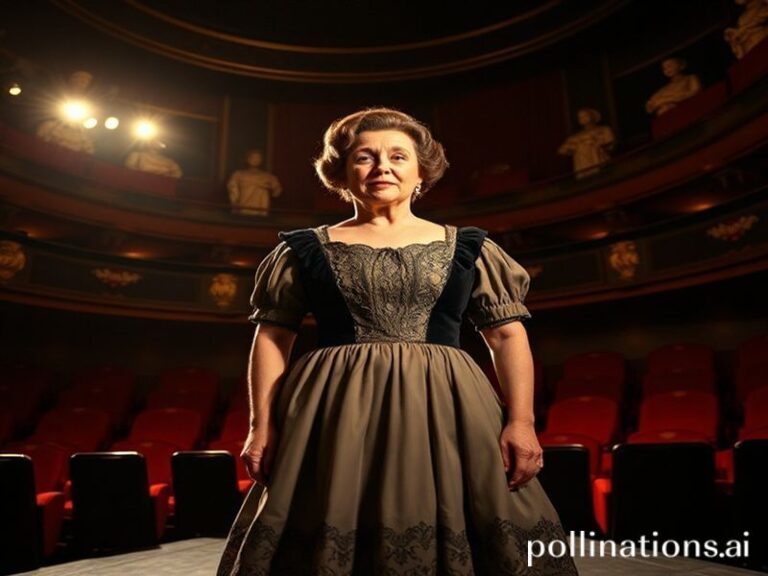Jaqueline Cristian’s Quiet Coup: How a Romanian Baseline Became the World’s Tiniest Geopolitical Weapon
The last time a Romanian woman made global headlines for racket work, it involved a certain Dracula and a wooden stake. This week it’s Jaqueline Cristian—no fangs, just a forehand that slices through hope like an IMF austerity package. While most of the planet was doom-scrolling about submarine implosions and the price of eggs, Cristian quietly clinched her second WTA 125 title in 2024, a feat that registers somewhere between “mildly impressive” and “Oh, right, tennis still exists” on the international Richter scale. Still, in a world where geopolitical meltdowns are served on the hour, any micro-dose of Romanian optimism deserves at least a raised eyebrow and a glass of cheap Merlot.
For the uninitiated, Cristian is 25, ranked just outside the top 100, and possesses the sort of baseline consistency that makes opponents question their life choices in real time. She grew up in Bucharest back when the city’s biggest exports were stray dogs and post-communist angst; now it exports baseline grinders who can moonlight as existential metaphors. Her win in Valencia—yes, the place famous for oranges and housing bubbles—wasn’t merely about hoisting a silver salad bowl. It was a reminder that small nations without aircraft carriers can still project soft power one topspin lob at a time.
Global implications? Glad you asked. The WTA 125 circuit is essentially the tennis equivalent of a regional airline: turbulent, underpaid, and prone to mechanical failure. Yet for players from countries whose GDPs are routinely outpaced by Zuckerberg’s daily stock fluctuations, these tournaments are diplomatic outposts. When Cristian wins, Romanian state television cuts away from parliamentary shouting matches, if only for thirty seconds. Thirty seconds of national unity—that’s roughly the half-life of a TikTok trend, but in the Balkans we take what we can get.
Meanwhile, in the algorithmic coliseums of Twitter, the victory triggered a flurry of hot takes: Western pundits hailed it as proof that Eastern Europe is still fertile ground for “grit,” a euphemism usually reserved for coal miners and Uber drivers. Asian betting syndicates adjusted futures markets by fractions of decimals, the monetary equivalent of spitting in the Danube. And somewhere in Dubai, a sheikh Googled “Cristian” and wondered if she’d pose with his falcon for Instagram—because nothing says “sportswashing” like a bird of prey perched on a tennis racquet.
The broader significance lies in the economics of aspiration. Cristian’s career prize money to date—about $850,000—wouldn’t cover the transfer fee of a third-string goalkeeper in the Saudi Pro League. Yet in a country where the average net salary hovers around €1,000 a month, that haul is practically a sovereign wealth fund. Every backhand winner is thus a miniature stimulus package, trickling down to coaches, stringers, and the kid hawking sunflower seeds outside the Dinamo Sports Club. Call it trickle-down topspin: Reaganomics with less cocaine and more clay-court footwork.
Of course, the cynical observer (hello, that’s you and me) notes that tennis is ultimately a gladiatorial spectacle for people who’ve already eaten. While Cristian battles through qualifying rounds, grain shipments still get blockaded, oceans still belch plastic, and billionaires still race each other to low-Earth orbit. But the beauty—and the absurdity—of sport is its insistence on manufacturing meaning out of thin air and fuzzy yellow balls. For two sets and a tiebreak, the scoreboard is democracy in action: every point earned, none inherited.
So here’s to Jaqueline Cristian, accidental ambassador of a country that’s spent centuries being somebody else’s buffer zone. May her serves stay unbroken, her flights stay non-delayed, and her prize money stay ahead of inflation—no small miracle in 2024. And if the planet finally implodes tomorrow, at least the highlight reels will show a Romanian woman planting her flag on a patch of Spanish clay, smiling like someone who still believes the next rally is worth playing. In this economy, that passes for optimism. We’ll take it, and we’ll pretend not to notice the cracks in the court.







